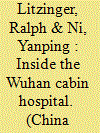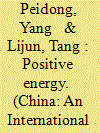| Srl | Item |
| 1 |
ID:
182978


|
|
|
|
|
| Summary/Abstract |
This article examines the making and circulation of vlogs on the Chinese platform Douyin during the Wuhan lockdown. We specifically draw attention to vlogs made in mobile cabin hospitals. Constructed between February and March in 2020, cabin hospitals were part of the state’s isolation and quarantine efforts, and these hospitals created spaces of confinement within a city under lockdown. The vlogs that we refer to are often bursting with energy, optimism, and play, and seem to be expressive of new modalities of care and social relationality. But they are also appropriated by the Chinese state, who used them as examples of ‘positive energy’ (正能量), and to promote the collective commitment to contain the virus. Focusing on the videos, blogs, and narrative storytelling of Li Jing, we show how the state appropriated her work to further its attempt to control the meaning of life and death during the ‘people’s war’ on the coronavirus. These and other state appropriations must also be understood within the context of the state’s involvement in platforms such as Douyin and the ‘platformization’ of everyday life both before and during the Wuhan lockdown.
|
|
|
|
|
|
|
|
|
|
|
|
|
|
|
|
| 2 |
ID:
159557


|
|
|
|
|
| Summary/Abstract |
Scholarship to date agrees that the internet has weakened the Chinese Party-state's ideological and discursive hegemony over society. This article documents a recent intervention into public discourse exercised by the Chinese state through appropriating and promoting a popular online catchphrase—"positive energy" (zheng nengliang). Analysing the "positive energy" phenomena using Laclau and Mouffe's theory of hegemony and discourse, the authors argue that the relative effectiveness of this hegemonic intervention rests on the semantic versatility of "positive energy", which enables "chains of equivalence" to be established between the label's popular meanings, on the one hand, and its propagandist meanings, on the other.
|
|
|
|
|
|
|
|
|
|
|
|
|
|
|
|